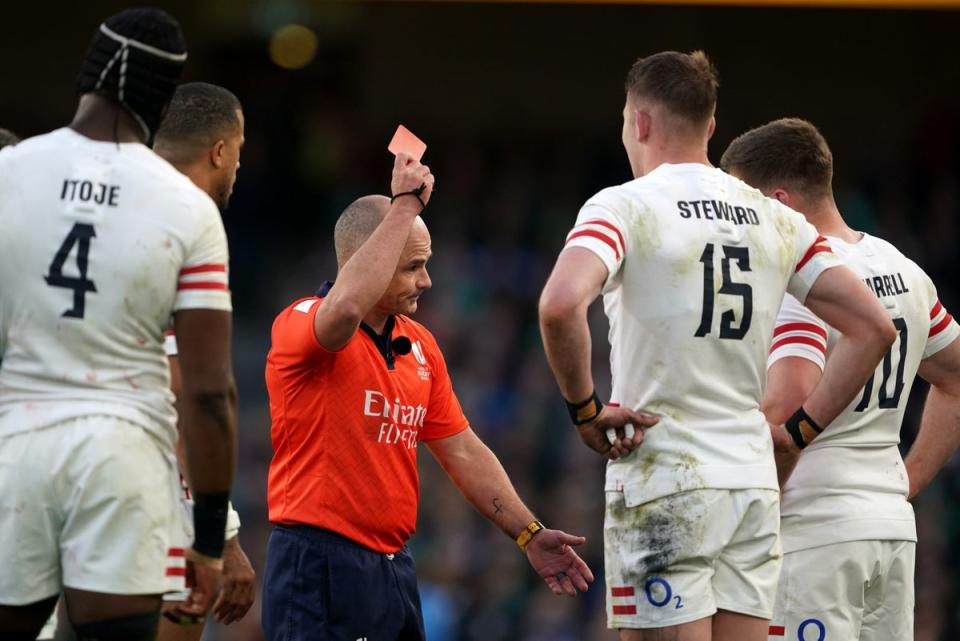Freddie Steward’s ridiculous red card shows rugby must make changes to survive
Rugby has a problem. Well, it has lots of problems. From outdated, archaic governance (cc: the Welsh Rugby Union – only narrowly averting a player strike during the Six Nations and battling an ongoing homophobia, racism, sexism and misogyny scandal) to an over-filled playing calendar and hundreds-strong concussion lawsuits from former players suffering the horrible after-effects of not being protected when playing the game they love.
But the problem that this weekend highlighted most was the way that rugby’s laws are set up too often leads to games being ruined.
The general consensus from players past and present, pundits and fans on both sides of the Irish Sea is that Freddie Steward’s red card during the crunch Ireland vs England clash was ridiculous. Or at the very least, incredibly harsh.
🟥 The moment England's evening got substantially more difficult
Did Freddie Steward deserve to see red for this?#ITVRugby | #GuinnessSixNations pic.twitter.com/G7T9jTUL3R— ITV Rugby (@ITVRugby) March 18, 2023
The ‘wisdom of the crowd’ is often a misnomer and following the general consensus is certainly no guarantee of reaching the right decision but in this instance, it is completely justified.
If you missed the incident, just before half time in the final game of this year’s Six Nations, Steward was sent off after his elbow made contact with Hugo Keenan’s head. With Keenan bending to pick up a spilled ball while running at his opposite number, the England full back turned his body to brace for the collision and accidentally contacted the Irishman’s head. The game was in the balance at the time of the red card, with England only trailing 10-6, but Ireland went on to win 29-16 against 14 men to complete a deserved grand slam.

The sending off ruined the Test match as a spectacle, with an already-outgunned England being unable to compete against a relentless Irish machine with a man disadvantage, and, while entertainment value should not be in the minds of referees when they’re making on-pitch decisions, it absolutely should be at the forefront of the law-makers’ thinking. Like all sports, rugby is ultimately just a fun diversion from everyday life and those spending their hard-earned money to watch deserve the optimal experience.
To be clear, player safety is paramount and law adjustments in recent years to reduce avoidable head trauma have been a good thing. The ‘dangerous tackle protocol’ referees run through when making a decision and the punishments to incentivise players to tackle lower and more safely are vital to ensuring rugby’s survival in the 21st century as we learn more about brain injuries. Anyone who red-facedly snarls that “the game has gone soft” is simply not worth listening to – it is more physical and brutal than it has ever been, and measures to reduce direct head contact won’t negatively affect that.
However, surely no one can watch the Steward incident and, in good faith, deem it as an avoidable head impact? Rugby is still a contact sport and collisions will happen.
“In the current climate… you’re upright, you’re into contact,” explained referee Jaco Peyper to Steward and baffled England skipper Owen Farrell. "You have time to turn your shoulder,” continued Peyper. “Direct contact to the head, it’s a high level of danger. No mitigation." And thus the red card was brandished.
How Peyper arrived at the decision that Steward had time to turn his shoulder is mystifying. Sure, super slow-motion replays suggest he could have made cup of tea and still had time to adjust his positioning but in reality, he had just 0.6 seconds between a bent-over, forward-moving Keenan picking up the spilled ball and contact. 0.6 seconds...
He turned to brace for impact to avoid a front-on collision with a man who, at that point, didn’t have the ball and the Irish full back – who was lower than his natural running position – made contact with the elbow. It was impossible, given the circumstances, for Steward to avoid contact. What could he have done differently?
Peyper was applying the dangerous tackle protocol to a situation that wasn’t a tackle and both Keenan’s body position and the lack of time between the ball being collected and impact should have been mitigating factors.
But even if “by the letter of the law, in the current climate…” a red card was warranted, a player being sent off for something they could do nothing about is wrong. Players are rightly punished when they fail “a duty of care” to their opponent by tackling dangerously but that’s not the same as an accidental, unavoidable incident such as this.
If it wants to protect its future, rugby has to bring a sense of perspective to on-field decisions and make law changes to stop its highest-profile matches being ruined for no reason.

 Yahoo Movies
Yahoo Movies 